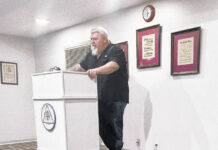
Peachland resident Jonathan Ross works as Single Engine Air Tanker Manager, filling air tankers with water and retardant to fight fires in Texas.
Contributed Photo by Jonathan Ross
WADESBORO — For the past several years, two N.C. Forest Service employees in Anson County volunteered and traveled out west to fight the wildfires. This year’s fires have been historic in their scope and level of destruction, and the two were more than ready to go back and help beat back the flames.
Gary McLendon and Jonathan Ross each traveled for a few weeks at a time to different locations in order to battle the fires. McLendon, a county ranger, traveled to northern California, near the Oregon state line.
“This helps build me up to be a better firefighter,” McLendon said. “You see different fuels, you see different terrains, what I don’t always see in Anson County.”
In northern California, McLendon saw hotter and dryer weather conditions, in much deeper terrain than here in the mild Anson County.
McLendon, dispatched as a division supervisor, worked for two weeks in two different locations. As a division supervisor, McLendon focuses on one section of the fire and he works closely with the operation personnel to help manage the different crews involved.
“You’re assigned to one area of the fire and they give us a mission to hold the fire in a certain area or put up structure protection around the little community … or coming up with different tactics to control the fire,” McLendon said.
At the first fire near Susanville and close to the Nevada and California border, McLendon worked on keeping the “Sheep Fire” contained. He helped clean up after the fire, making sure the weather wouldn’t spark another one.
“I spent seven days there and a new fire broke out near the little town of Happy Camp, California.” McLendon said. “We were there with the Slater Fire and Devil Fire. It was actually two fires that broke out close to each other.”
While working on his second fire, McLendon was responsible for building contingency lines around the town. Luckily the fire never reached that specific area, although the town has been hit by fires in the past.
According to the Incident Information System, the Slater and Devil Fires burned over 150,000 acres, and is only 38% contained as of Sept. 28.
Fighting wildfires is a collaborative effort beyond the ones on the front lines, as both McLendon and Ross explained. Jobs range from camps to logistics, planning, operations, incident commanders and even public information officers.
Ross, a Peachland resident, is one of those behind-the-scenes volunteers. For three weeks in Texas and another three weeks in Idaho, Ross filled air tankers with water and retardant to fight the fires as the Single Engine Air Tanker (SEAT) Manager.
Every year since 2011, Ross traveled out west to combat the fires, but just recently he turned his focus on working with aviation, as he showed an interest and knew there was a need for help with air tanker reloads.
A typical 12 to 16 hour day for Ross involves rolling a hose out on skates to the air tanker and connecting the hose to the plane. He must communicate with a mix master, who mixes water with the retardant, which is a precise calculation. Ross, or a loader, gives a thumbs up to the mix master to start pumping the mixture into the air tankers. On a SEAT air tanker, the pilot usually tells when to cut it off or, in a large air tanker, there are digital reads to show when to cut it off.
Depending on the type of air tanker, one can hold between 800 to 10,200 gallons of retardant. One day in Texas, Ross filled 35,000 gallons of the water and retardant mixture. In previous years, he has filled up to 80,000 gallons.
“The small (air tankers) like I said hold 800 gallons, that weighs as much as your vehicle,” Ross said.
Ross knows ahead of time where he will be placed, but McLendon on the other hand, finds out when he travels where he is needed, only to be moved again when another fire breaks out.
“I’m trying to do anything I can to help out those states,” Ross said.
Ross enjoys these times helping out. He usually goes out as a trainee, but comes back with new qualifications since there are multiple fires he assists.
“I’m bringing back the qualifications, knowledge and experience back to North Carolina to help the state out whenever we have fires,” Ross said. “I’ll be able to gain more experience quicker out West.”
McLendon enjoys working with the different personnel out west and seeing other fire control methods and strategies.
“What we learn on different fires, we can bring that back here to make us a better fire fighter here,” McLendon said.
Although record breaking fires are ripping through the west coast, both McLendon and Ross did not notice too many differences compared to years in the past. One thing Ross pointed out is how Military C130s have been activated and are being used in California because there are so many fires. McLendon saw a lack of resources this year while fighting the fires, but he doesn’t necessarily know if it is due to the amount of fires or because of the pandemic.
Fighting the fires through a pandemic also did differ too much if you look at previous years. McLendon said other than the mask mandates at the camps where fire fighters sleep, there was no extra precautions for COVID-19.
As wildfire season continues through the fall, Ross plans to travel again in October to the Pacific North West, but nothing is confirmed yet.
Reach Liz O’Connell at 267-467-5613 or at eoconnell@ansonrecord.com. Follow on Twitter at @_eoconnell.





